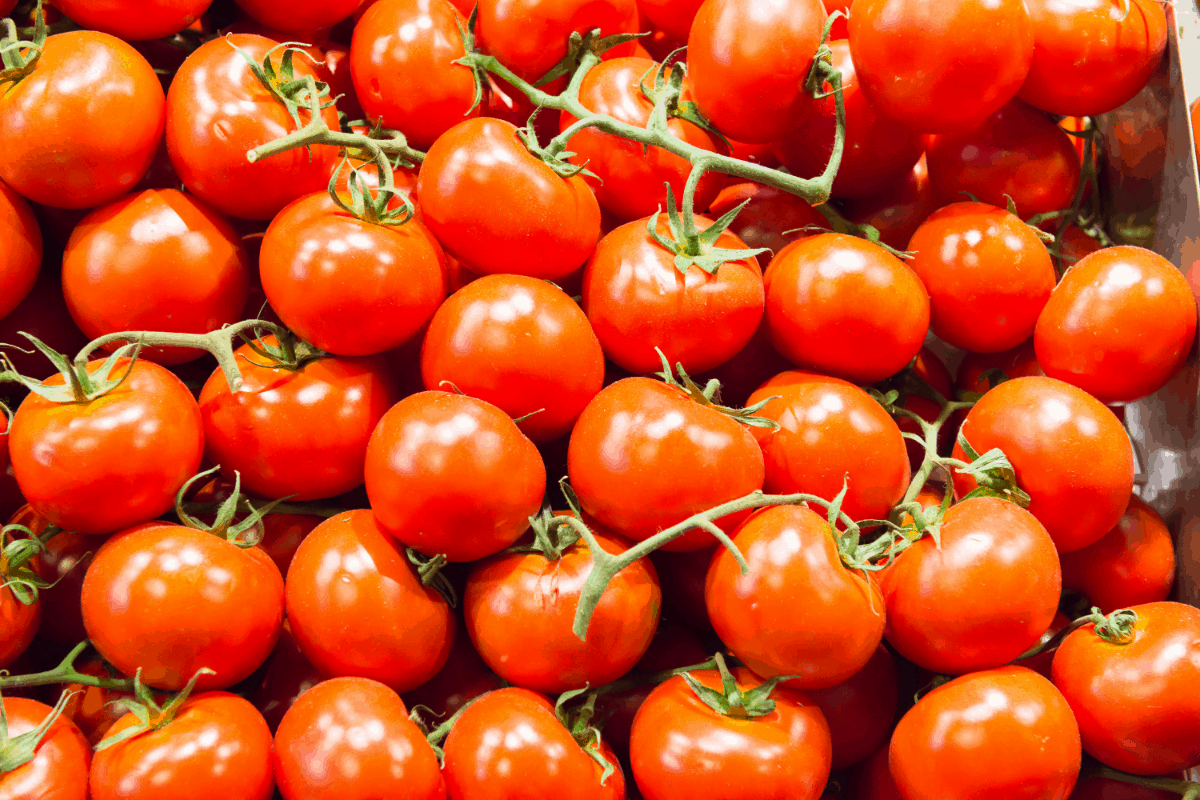Last Updated on January 21, 2023 by Griselda M.
The variety of options can confuse when choosing the best fertilizer ratio for tomatoes. First, let me state you can relax a bit – it is not very easy to make a huge mistake, and secondly, we are going to help you make the best choices based on years of experience.
We use fertilizers to increase the yield and size and health of our tomatoes. The plants are heavy feeders, and without a bit of help in the soil, they will deplete even good soil in a few weeks of growth. This means that we have to add some supplemental fertilizer to the soil to keep the plants in optimal health.
But before we delve into that, let’s lay some foundations on tomato fertilizer and some facts you should be aware of.
What is Tomato Fertilizer?
A tomato fertilizer can be a synthetic or natural substance that is included in the soil at appropriate times (which you’ll find out in the course of this article) to promote soil fertility and thus the rapid growth of tomatoes.
Chemical Composition of a Tomato Fertilizer
Fertilizers often have a number, which is the NPK Ratio – for instance, 2:3:2 – this is the proportion of Nitrogen (N), Phosphorous (P), and Potassium (K). These are the main “Macronutrients” or nutrients a plant needs in large supply. Synthetic chemical fertilizers often can quite purely provide just these nutrients. Organic fertilizers are made from natural nutrient sources and tend to have Macronutrients and Micronutions (things needed in traces, such as Copper, Boron, Selenium, Manganese, etc) in them. If you buy a chemical fertilizer containing macronutrients, you will also probably need to buy a micronutrient fertilizer to use as well. If you buy organic fertilizer, it will most often provide both.
Functions of The Macronutrients and Micronutrients Present in the Fertilizer
The macronutrients are needed by the plant in substantial amounts, while the micronutrients provide auxiliary roles in the fertility objective of fertilizers.
Nitrogen is there to facilitate the growth of lush stems and leaves. Phosphorus and potassium are particularly important for facilitating the production of fresh fruits in the season, as well as the promotion of photosynthesis and the growth of roots. With this in mind, let’s now look at the crux of the article.
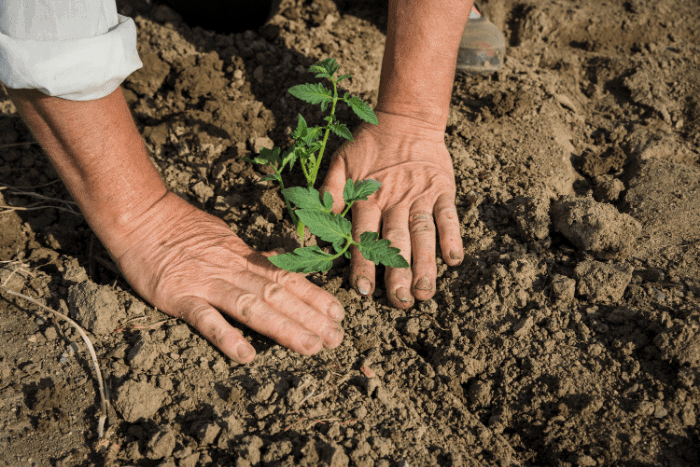
What Are The Best Fertilizers For Tomatoes?
To answer this question, we should first ask “Why am I growing Tomatoes?” This will determine what fertilizer you need and the best fertilizer ratio for tomatoes. Commercial mass-produced tomatoes are typically grown on synthetic fertilizers. This makes the tomatoes cheap, and also relatively tasteless. Organic tomatoes are grown using healthy soil and organic fertilizers – these cost more and taste much better. If you are aiming for bulk tomato production, at a low cost, then synthetic fertilizers are for you. If you are chasing taste, and health, organic fertilizers are a better choice.
The Best NPK Ratio For Tomatoes – Why Nitrogen Should Be less
Nitrogen is necessary to promote lush green stems and leaves, but when its concentration becomes excessive, it often leads to the production of long stems and big leaves, with fewer fruits to account for such mighty foliage. You want to grow a fruit-producing plant, not a pot plant.
On the other hand, fertilizers with Nitrogen, Phosphorus, and Potassium with concentrations in a ratio of 8-32-16, can boost the growth of tomatoes. I have had my best results years ago when I used fertilizers using a 3-4-6 during growth and 8-32-16 fertilizer during fruiting and compost-rich sandy soil.
8-32-16 fertilizer for tomatoes
This is a type of fertilizer that can be used, more commonly in starting a lawn or turf building. It will work on tomatoes, and, as with nearly any chemical fertilizer, you will see better growth – initially at least. There seems to be some sort of meme that has developed around the use of this fertilizer for tomatoes. In my experience, I have found I get far better results on both taste and yield using good compost-rich soil, organic fertilizers that provide slow nutrient release, and thick mulch.
When I did use the above ratio, I found that it caused my soil to become less compost rich – it caused a rapid overgrowth of soil fungi – I suspect non-beneficial ones – and the soil became hard and compact due to the loss of organic matter in the soil. When I feed my soil with organic matter (mulch, manure, bone meal) the soil improves each year, as opposed to getting worse each year. The taste of the tomatoes also improves each year. There is a problem with producing really delicious tomatoes – they attract rats, so as your growing gets better, you will need to consider controlling the rats that come to eat your crop.
The best NPK ratio for tomatoes
In essence, the best fertilizer ratio for tomatoes should have lower concentrations of nitrogen compared to other macronutrients. You need healthier fruits, not longer stems, and leaves.
1. Miracle-Gro Performance Organics Edibles Plant Nutrition
- OMRI listed plant food as suitable for organic gardening
- Presentation: granules
- 2.5 lb
- Organic and natural ingredients
- You need to reapply every 4-6 weeks
- You don’t need to mix it with water
- It is specially formulated for growing tomatoes, vegetables, herbs, and fruits
- It is a 9-2-7 fertilizer (Nitrogen-Phosphate-Potash)
I would use this during the growth phase of plants, as it has low Phosphate, and higher Nitrogen and Potassium – this will give you nice leaves, and a decent plant size. However, once flowering starts transition to another fertilizer with a higher phosphate component and slightly less nitrogen.

2. Espoma Tomato Tone- Tomato and Vegetable Food
- Prevents blossom end rot
- 18 lb
- Natural and organic plant food is enhanced with thousands of living microbes and is approved for organic gardening.
- It is specifically formulated to produce consistently plump, juicy tomatoes
- A complete plant food with all 15 essential nutrients
- Long-lasting, slow-release feeding
- It is a 3-4-6-8-3 (Nitrogen, Phosphate, Potash, Calcium, Sulfur)
What you find with any of these microbially enhanced fertilizers is that they will act on your soil – phosphate solubilizing microbes will actually mine phosphate out of the soil, and mycorrhizal fungi will help your plant roots absorb everything. This is how we fix the world and create living soil that makes food taste good!
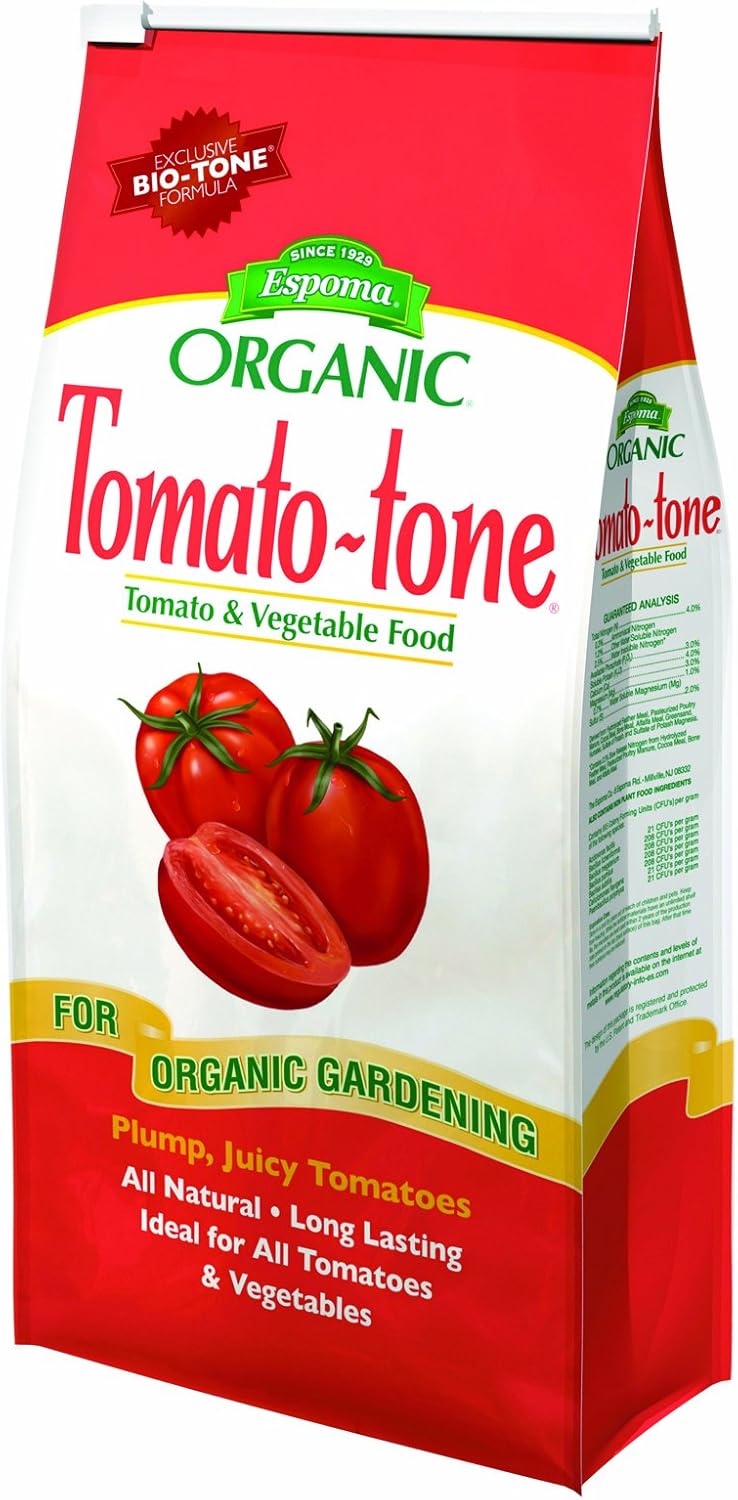
3. Dr. Earth Organic 5 Tomato, Vegetable & Herb Fertilizer
- 4 lb
- Contains pro-biotic, seven champion strains of beneficial soil microbes plus ecto and endo mycorrhizae
- OMRI (Organic Material Review Institute), OIM (Organic Input Materials), CCOF (California Certified Organic Farmers), NOP (National Organic Program), and Non-GMO Project Verified the highest level of purity and transparency.
- Sustainably made in the U.S.A.
This product also protects the roots and enhanced nutrient cycling due to the presence of beneficial fungi and bacteria.
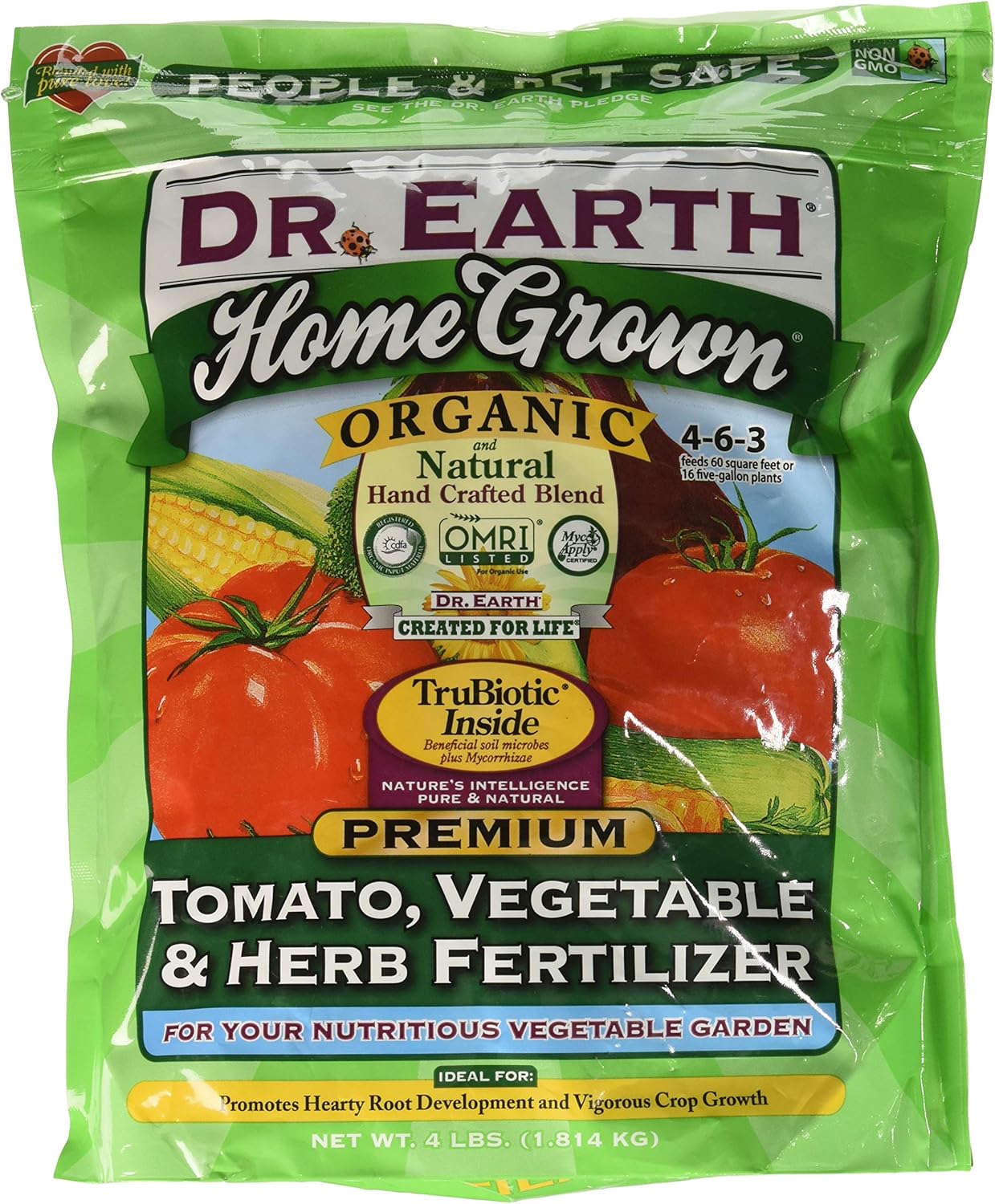
4. Jobe’s Tomato Fertilizer Spikes
- 3.9 oz
- Made in U.S.A
- Continuous supply of nutrients below the surface
- 18 spikes with pre-measured fertilizer
- 6-18-6 time-release fertilizer for all tomato plants
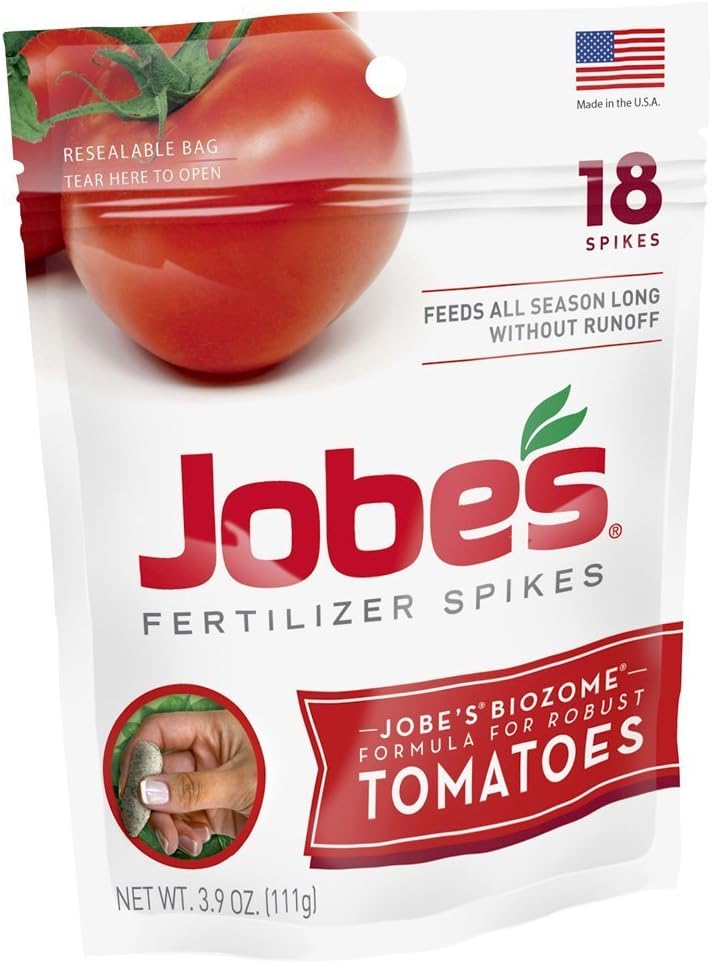
5. Botanicare Cal-Mag Plus Calcium Magnesium & Iron Plant Supplement
- 2.2 lb
- Highly beneficial calcium, magnesium, iron, and trace mineral plant nutrient supplement
- It helps maximize yields in fruiting and flowering plant varieties like tomatoes
- This plant supplement prevents blossom end rot in tomatoes
- It has better results using it together with another fertilizer
- You will require to adjust the pH
- Recommended for hydroponics
This is not really an NPK fertilizer, but, if for whichever complex internal reasons you feel the need to try to grow tomatoes hydroponically, rather than in a living soil, this can help them taste almost like a tomato.
If you have healthy soil, products such as this can help to even out small wobbles in micronutrient supply that do happen from time to time.
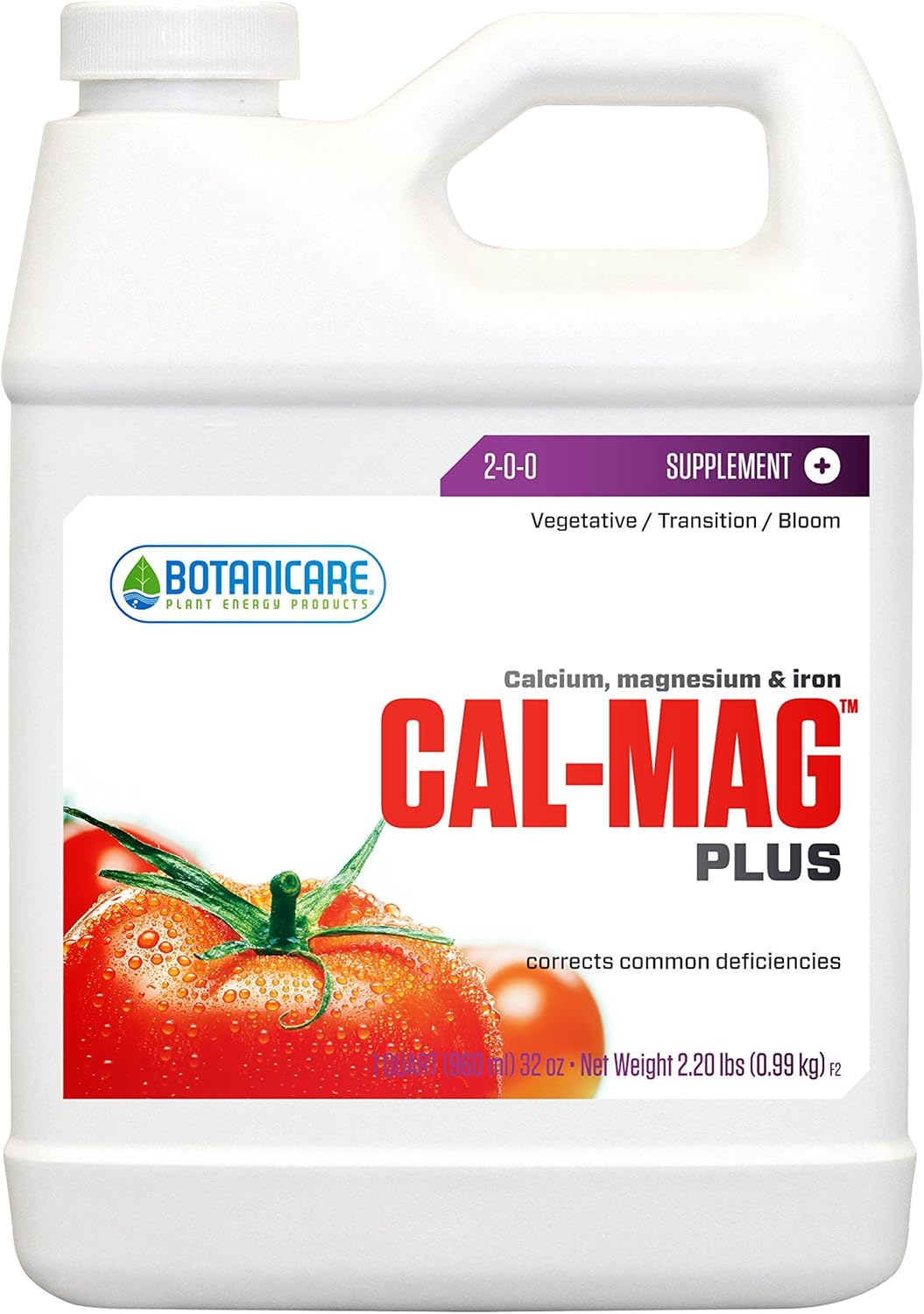
When to Use Tomato Plant Fertilizers
The most ideal time for the application of organic tomato fertilizers is before planting the seeds, and when they are starting to blossom. Many organic fertilizers come with beneficial microbes, and all sorts of slow-release mechanisms, so mixing them into the soil before planting allows everything to get going.
Chemical fertilizers can be added as per the instructions on the label. These vary depending on whether they are soluble, slow-release, or some other configuration.
When you start seeing the first fruits, you can apply the appropriate lower nitrogen higher phosphate fertilizer again. It should be continuous, perhaps fortnightly or weekly until it reaches its harvest time.
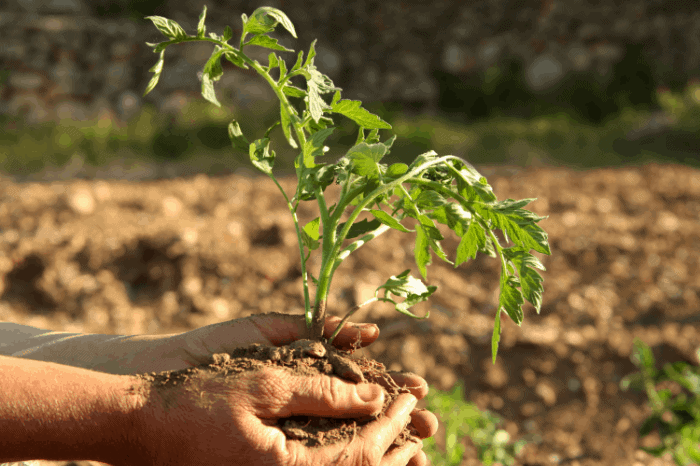
Why you should apply them before planting
Nutrients like phosphorus are responsible for the growth of roots as well as fruits. If the roots don’t establish themselves faster and adequately, they can’t lead to the bearing of fruits. Some of the organic products listed above contain living soil microbes – these have to grow and multiply in your soil. If you mix these amendments into your soil before planting, the soil microbes are ready to help the plant. Some will protect the roots from pathogenic fungi, some will begin making nutrients soluble for the plant, and so on.
Fertilizer for Tomatoes Options
If you want to ditch synthetic fertilizers for their organic counterparts, they are sold in the market or you can make yours at home. Chicken, pet rabbit and hamster manure can be made at home by dissolving their wastes in water. Or you can just put the animal waste under the mulch.
These homemade manures should be supplemented with wood ash to boost the supply of phosphorus and potassium. The Epsoma Tomato-Tone and Doctor Earth Organic Fertilizers are available for purchase in the market.
Fertilizing Tomatoes Plants
Prepping the Soil
Before applying fertilizers, you should prepare the soil. If you are using soil beds, they should be well turned over and sprinkled with some other organic matter, especially compost. The compost should be about 30% of the mixture of the total soil. I use closer to 50% as my whole garden is a compost heap.
You can use Wiggle Worm Soil Builder, this compost is OMRI listed, which means this product qualifies as organic under the USDA’s National Organic Program (NOP).
Tomatoes are voracious nutrient consumers, so they need a well-balanced soil that feeds them to develop. You may also carry out a soil analysis to ascertain the nutritional value of the soil, and to know the kind of fertilizer you’ll be using. You need to also water the soil properly before applying any fertilizer.
If your soil has a lot of compost, and you keep feeding it each year, you will find after a year or two of care, that it will produce the best-tasting tomatoes. Good soil = great taste.
Why the preparations?
The preparations will have to be in order because you will have to prepare your soil bed in a way that will be loose, and not too compact that you can’t pierce your finger through it uninhibited. Loose soils are favorable for the growth of tomatoes. This is why I favor a lot of compost!! Compost makes soil friable and loose.
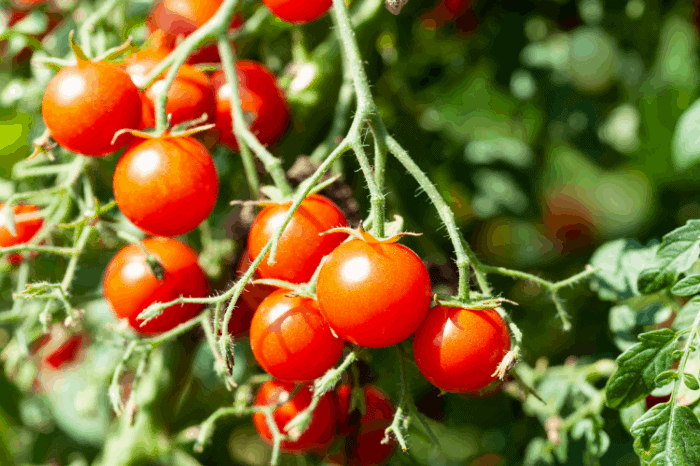
The soil analysis is to help determine the kind of fertilizer that will be suitable for the soil. If the soil is remarkably deficient in Phosphorus and Potassium, then you need an N-P-K fertilizer in the ratio of 5-10-10.
Watering the soil continuously prevents a lack of moisture, which is very necessary for its growth. Overwatering the soil will however cause it to become waterlogged, or wash Potassium (K) from the soil.
Using the Fertilizer
There was a time when we could say, spread the fertilizer. The list of fertilizers above has such diverse methods of application, that my general advice is to read the manual, or watch the little videos these companies now often include in their promotional material. This will give you the best advice on how to use the particular choices you have made.
Conclusion – The Best NPK Ratio For Tomatoes
The best fertilizer for tomatoes can be found in any fertilizing product where the nitrogen composition is lower than Phosphate and Potassium, because an excess in nitrogen promotes foliage, at the expense of the growth of each fruit.
Fertilizers are necessary for the growth of plants because most soils aren’t fertile enough to grow them. However, the application process of these fertilizers is of sheer importance, as getting them right, often leads to the right results.
You can, however, opt for organic fertilizers for your tomato production, like The Epsoma Tomato-Tone and Doctor Earth Organic Fertilizer. These will build up the health of your soil with each year, and over time you will find that your soil becomes much better at feeding plants than when you started. Adding compost to the soil each year also helps a lot. In my opinion, healthy soil will always be the best fertilizer ratio for tomatoes, as it will provide your plants with what they need when they need it.
We will be waiting for you in the comment section to field any questions you may have.
FAQs
What are the most important nutrients for tomatoes?
There are three primary nutrients needed for the development of healthy tomatoes. The first is potassium, which is needed for strong plant growth. The second is nitrogen, which provides them with energy to build their leaves and fruits. The third is phosphorus, which also helps develop a healthy tomato plant.
What is the best homemade fertilizer for tomatoes?
The best homemade fertilizer for tomatoes will contain an increased amount of nitrogen and phosphorus compared to commercial fertilizers and commonly available compost, as well as a good amount of potassium in order to promote a healthy tomato plant.
Tomato plants don't require much fertilizer, and the best one to use is compost.
There are many different types of homemade fertilizer that can be used to help your tomato plants grow stronger roots and healthier leaves. Some common ingredients in homemade fertilizers include fish emulsion and chicken manure, while others include coffee grounds or even detergent pods.
What does Epsom salt do for tomatoes?
If you want to grow a tomato that is resistant to heat, cold, and disease, then you need to add Epsom salt to the soil.
Epsom salt is a magnesium sulfate which helps tomatoes grow better by improving nutrition and increasing their resistance against diseases. It can be used for a number of things including helping tomatoes preserve flavor during the ripening process
Which type of fertilizer helps tomato plants grow the fastest?
The answer to this question is, in fact, quite simple. Most gardeners are aware that tomatoes are heavy feeders and they need a lot of nutrients to grow at their best. In order to achieve this it is imperative that the soil which they are grown in is as perfect as possible.
The most important thing for a good yield from tomato plants is a well-balanced fertilizer, consisting of nitrogen, phosphorus and potassium, together with other nutrients such as calcium and magnesium.
There are many different types of fertilizers that you can use for your tomato plants, but the type of fertilizer that is best for your plants depends on a number of factors including how much time you have to spend gardening and the type of soil you have around your plant.
Aerobic fertilizer can also be used for tomatoes. Aerobic fertilizers include manure, compost, and chemical fertilizers such as ammonium nitrate or urea. Chemical fertilizers provide nitrogen to help tomatoes grow. Manure provides phosphorus which helps promote flowering and fruiting in tomato plants. Compost provides microbes which help break down organic matter in the soil and make nutrients available for plant uptake.
How much fertilizer do tomato plants need?
One of the most important things that you should know about tomato plants is that they need a lot of fertilizer.
Tomato plants require a lot of nitrogen and potassium. They also need phosphorous, but only in small quantities. Luckily, even if you don't have enough phosphorus for your plants, they'll still do alright as long as you have enough phosphorous and potassium available to them.
Tomatoes plants grow well in soil that has a pH level of 6.5 to 7.5 and need a lot of fertilizer.
The amount of fertilizer needed by tomato plants depends on the type of fertilizer and the soil's pH level. Tomato plants require more nitrogen than other plants, so they need higher levels of fertilizer containing nitrogen, such as ammonium nitrate. The type and composition of the soil also affects how much fertilize you need to give your tomatoes plants. If your soil is acidic (pH lower than 7), you will need to fertilize more because it won't be able to take up nutrients as well as an alkaline (pH higher than 7) soil can do.
Tony Manhart is a passionate gardener who has been tending to gardens for over 20 years. He takes pride in creating beautiful outdoor spaces with plants, trees, and shrubs that can thrive in any environment. He loves to share his knowledge with others and has taught classes on gardening basics and advanced techniques. He is committed to sustainability, using natural and organic methods to create and maintain gardens. He also works with local organizations to create green spaces for communities. When he’s not gardening, Tony enjoys hiking, reading, and spending time with his family.

